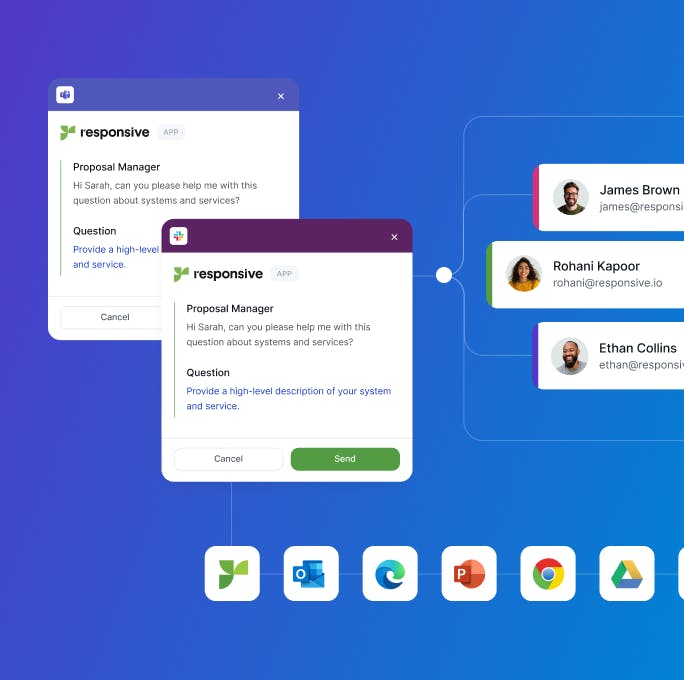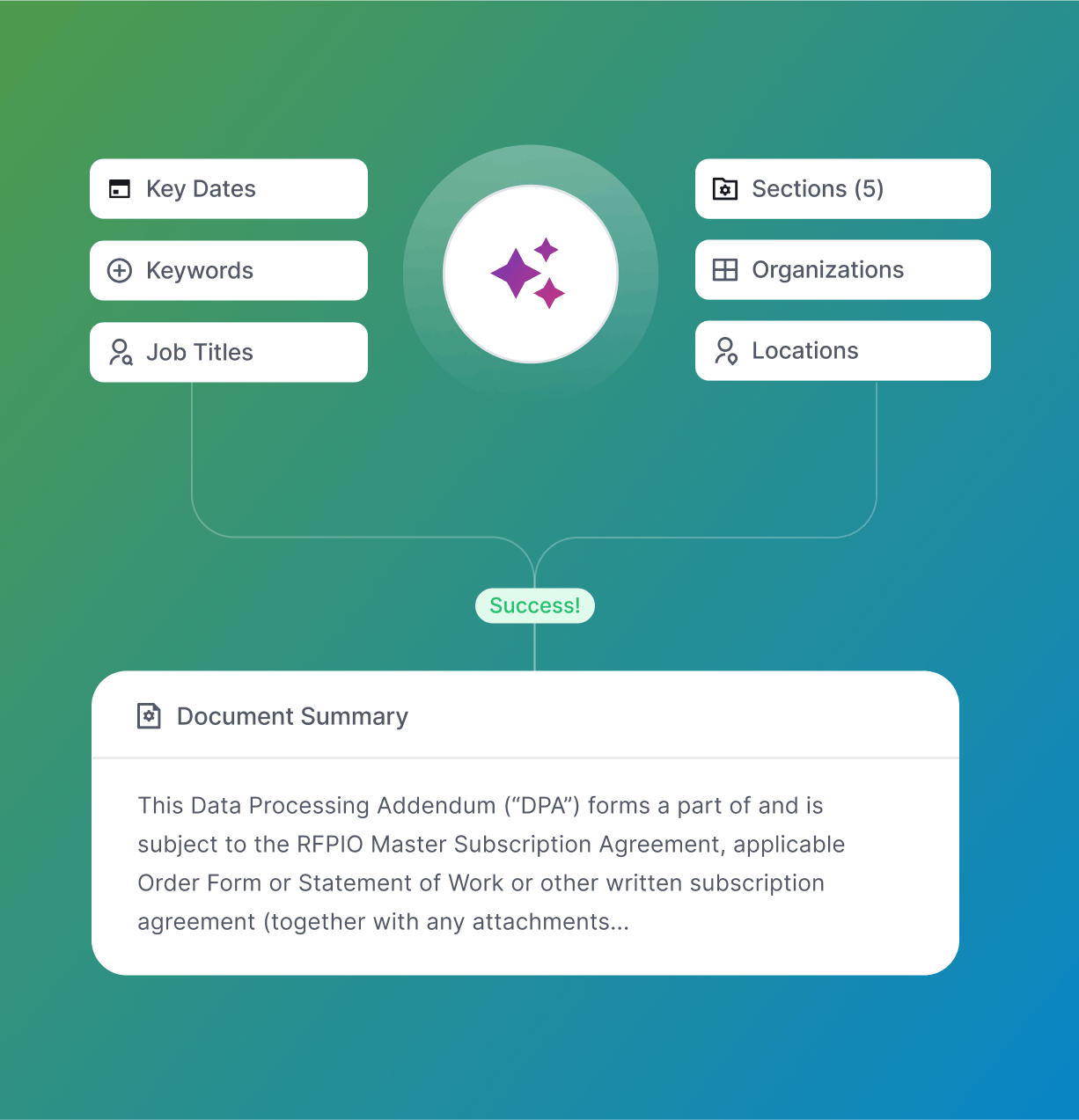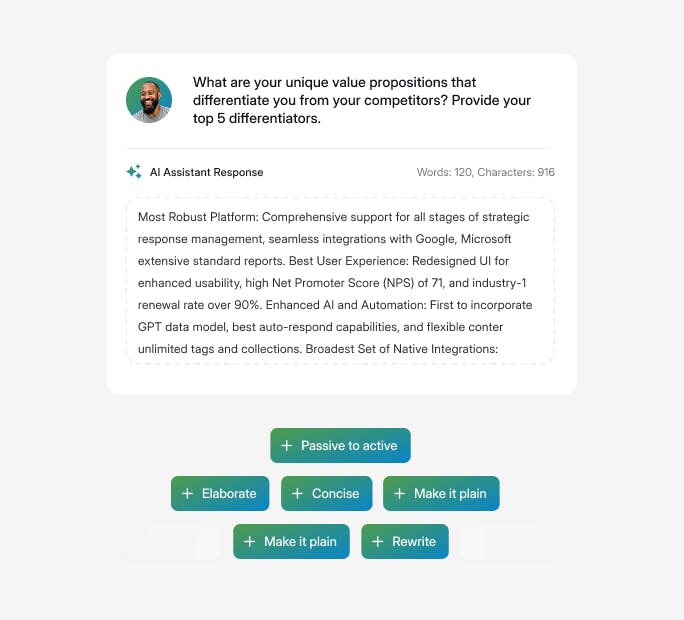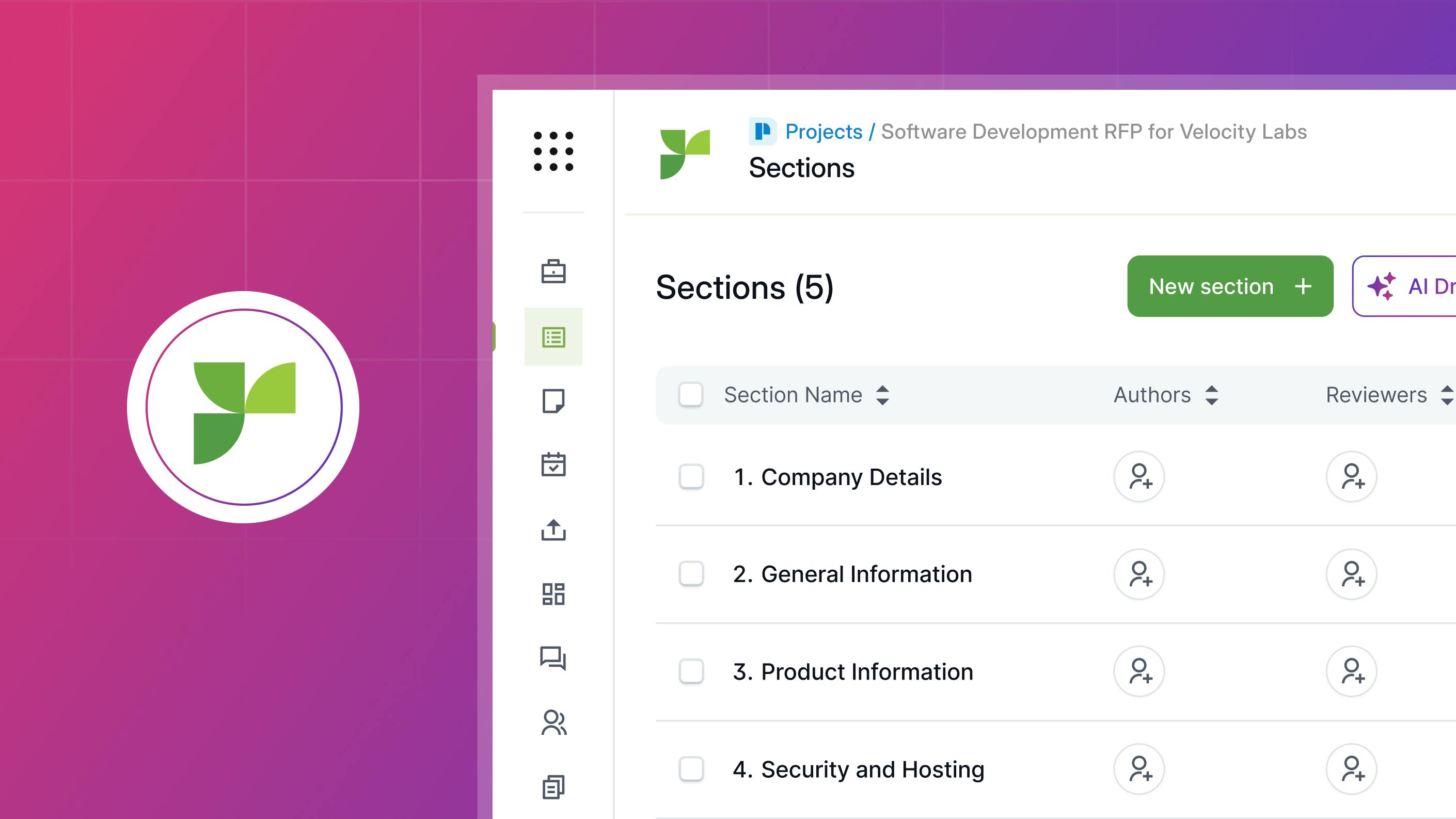An AI proposal generator is a tool that uses artificial intelligence (AI) to support or automate parts of the proposal creation process. These tools pull from your structured data sets, unstructured content libraries, and previous proposals to produce a draft response that meets your organization's standards and brand voice.
Over the past few years, developments in generative AI (GenAI) have significantly increased the scope and quality of outputs from these tools, expanding their utility across various business functions including sales, marketing, legal, and compliance.
If you're managing proposals, you're likely looking for clarity on how these tools work, how to compare your options, and what to expect from the experience. This blog covers the benefits of using AI proposal tools, highlights the key players in the space, outlines how these platforms work, and offers guidance to help you choose the best fit.
If you're ready to explore more after that, we've included next steps for you to get started.
Why proposal teams rely on AI generators
If you're responsible for responding to requests for proposals (RFPs), due diligence questionnaires (DDQs), or other complex questionnaires, you know how demanding that work can be. You're managing high-stakes deliverables on short timelines, and every response must reflect your organization's credibility and expertise. AI-powered tools lighten that load by automating time-intensive steps like answer matching, content sourcing, and formatting.
Benefits of using AI proposal generators include:
- Reduced manual effort, thanks to tools that quickly surface relevant answers and assemble cohesive responses
- Improved turnaround time by minimizing back-and-forth between subject matter experts and proposal managers
- More consistent deliverables, fewer copy-paste errors, and less risk of outdated messaging
- Increased capacity to respond to more RFPs without needing to grow your team
When integrated into an end-to-end response platform, these tools also reduce process inefficiencies. You spend less time chasing stakeholders or reformatting documents — and more time customizing your message to the opportunity. Gartner studies show automation and AI tools are becoming essential for high-performing proposal teams, especially as sales cycles shorten and buyer expectations increase.
The best AI proposal generators: a comparison
With more AI-enhanced proposal tools available than ever, you have plenty of options to choose from. Here's a look at how the top vendors stack up based on features, strengths, limitations, and pricing. This isn't an exhaustive list, but it includes the platforms most often brought up by proposal professionals.
Responsive

The Responsive Platform offers AI-powered proposal generation as part of a comprehensive response management solution. Its Proposal Builder uses a combination of generative AI and intelligent search to generate draft responses directly from your centralized Content Library. You can review, customize, and approve answers within the same workflow keeping your projects on track and in compliance.
Responsive stands out for its seamless collaboration, high-quality AI outputs, and workflows designed for complex sales environments. The platform integrates with Salesforce, Slack, and Microsoft tools, and supports scale across teams.
Pricing for the Responsive platform is customized based on your platform needs
Loopio
Loopio offers a feature called Magic that uses AI to recommend relevant answers from your content library. It speeds up response time by helping you avoid repetitive research. Its simple interface and user-friendly experience make it appealing for mid-sized teams.
That said, Loopio's AI capabilities are focused mainly on suggestions, not automated content generation. If you're looking for collaborative editing or flexible workflows, you may find it lacking. Pricing typically starts at the mid-market level and increases with scale and add-ons.
Proposify
Proposify is known for its clean templates and sales-focused tools. You can create proposals using modular content blocks and drag-and-drop editing. AI features include predictive content suggestions and template personalization.
It's a good fit if you're on a smaller sales team creating a high volume of proposals with limited customization needs. However, its AI engine is more basic and better suited to straightforward use cases. Plans are subscription-based and begin at entry-level pricing.
DocGenius
DocGenius positions itself as a document automation tool rather than a dedicated proposal platform. It helps generate proposals and contracts using structured inputs and legal-friendly templates.
If you're in a niche industry with specific compliance needs, this could work for you. But for teams that rely on bid/no-bid workflows, collaboration, and CRM integration, it may not be the right fit. Pricing depends on document volume and your organization type.
What to expect from your AI proposal generator
Before selecting a proposal tool, it's helpful to understand the capabilities you can expect. The strongest platforms combine automation and collaboration to keep your team aligned and moving efficiently.
You should look for tools that enhance your judgment — not replace it — and that support accountability at every step of the process. These platforms often include integrated content libraries, eSignature support, and access controls.
For a broader view of your full toolset, see what to consider for your proposal tech stack here.
How it works

AI proposal generators typically follow a multi-step process. You start by inputting content by either uploading an RFP or pasting questions into the platform. The AI analyzes the request, identifies keywords and context, and matches it with your content.
The platform then drafts a response using relevant entries from your library, past proposals, or structured sources. You can edit the draft directly in the tool, finalize it, and export it in a format that meets submission requirements.
Features to look for
When you're evaluating options, keep an eye out for features like:
- Support for bid/no-bid decisions
- Automated response generation
- Smart search within your content library
- In-platform editing and approvals
- Reporting on usage, timing, and win rates
Many platforms also include access permissions, eSignature support, and integrations with tools like Salesforce or Slack.
The value of a purpose-made solution
If you're tempted to use a free writing assistant, you should know there are tradeoffs. General-purpose tools may lack data privacy protections or the context to generate accurate, brand-aligned responses.
Proposal-specific platforms give you content governance, integration options, and messaging quality you can trust. You'll also benefit from audit trails, version control, and collaboration tools that help you avoid version confusion and compliance risks. Proposal-specific platforms like Responsive offer features that generic tools can't match — See how a proposal writer compares here.
What to consider when selecting a proposal generator
The right tool for you depends on your workflow, scale, and collaboration needs. If your team is spread across time zones, you'll want strong editing and version control. If legal review is part of your process, auditability and approval workflows will be critical.
You should also be aware of the challenges that come with AI-generated content, like occasional inaccuracies or generic language. According to Forrester, companies shopping for AI tools should also closely examine how vendors manage data security and ensure content quality.
Start by identifying what you're trying to improve — speed, quality, efficiency — and ask vendors how they can help. Don't hesitate to request proof of performance or set up a pilot program before you commit.
Redefine proposal creation with Responsive AI

With Responsive, you get a platform that blends automation with flexibility. The AI Assistant helps you throughout your proposal process, from sourcing content to final review. Proposal Builder creates smart drafts based on your content, but you stay in control of the messaging.
Responsive's integrations, user-friendly workflows, and secure content management make it a solid choice if you're aiming to scale without losing quality. It's trusted by teams across tech, finance, and healthcare — and it evolves based on real customer feedback.
